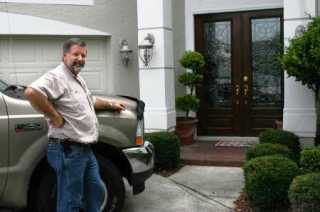|
Article Courtesy of The St. Petersburg Times By Rodney Thrash August 15, 2009 At 3,800 square feet, it had
four bedrooms, a game room, a swimming pool and a driveway big enough for his
Ford F-350. He didn't like the garage. No
reason. "I just never cared to park in there," he said. He was so
adamant, he didn't begin negotiations or sign a contract with the builder until
he had the assurance that the deed restrictions allowed him to park outside.
Prolonged
— and some might argue trivial —
homeowners association spats fill State Rep. Kevin Ambler,
R-Tampa, has tried for years to get both sides to consider swift and inexpensive
resolutions rather than resorting to lawyers and costly court battles. His Home
Court Advantage program would allow the HOA or the homeowner to file a dispute
and settle the issue within 90 days through mediation. The cost: $300. The measure passed the House and the Senate in 2008 before Gov. Charlie Crist vetoed it. It passed the House again this year, but the legislative session ended before the Senate could follow suit. Ambler plans to reintroduce the
bill during the next legislative session. He said he keeps pushing the issue
because more than 80 percent of Floridians live under HOAs. "When you have that large
amount of people that are affected," he said, "it's important that we
give them a more efficient, less expensive way to amicably resolve their
differences so that these folks can get back to being good neighbors." He said there is no way to track
how widespread HOA tiffs have become. The state's 67 counties aren't yet on a
uniform system that would allow officials to extrapolate data like that. Reports
are largely anecdotal. There was the flap over a
mailbox in suburban Closer to home, the Pebble Creek
Homeowners Association in New Tampa is in a nine-years-long battle with
homeowner Edward Simmons. His crime? Dead grass. "This was a small claims
court issue," said Simmons, who has had five lawyers and spent more than
$100,000 on a case that has been before five judges. "I thought it would be
over after one hearing." Cases like the one in Pebble
Creek may sound frivolous, but association board members say they are elected to
uphold community rules and standards. If homeowners ran amok, lawns would be
unkempt, houses would be painted fuchsia and property values would fall. "We have a duty and a
responsibility," said Ishwer Mulchandani, president of the Van Dyke Farms
HOA in 'Selectively enforcing' Vizzi did not have anything
against deed-restricted communities before his "nightmare" began. It
was one of the reasons he moved into the Eagles. "We liked the fact that we
were moving into a gated community that had security 24 hours," he said.
"You can see how tranquil it is." What Vizzi did not anticipate
was the Eagles taking him to court. He received five more letters
between October 2001 and May 2003, at which point they stopped coming. There was
no correspondence between either side for nearly two years. It wasn't until
February 2005 that the notices resumed and December 2006 that the Eagles filed
suit. All along, Vizzi had asked for a
hearing before an impartial community board. The request was denied. He'd
offered to trade in his truck, which was too big to fit in the garage, for a
smaller one that would. The association had allowed other people in his
situation to do that, Vizzi said. "Yet me they said, 'You
have to make arrangements to get rid of that truck now,' " he said.
"That's not enforcing the rules. That's selectively enforcing." Officials with the Eagles have
not responded to requests for interviews with the St. Petersburg Times
since November. The association's lawyer did not respond by press time. Friendlier approach At least one Hillsborough
neighborhood has figured out a way to settle squabbles before they reach an
attorney. Van Dyke Farms, a community of 421 homes, created a committee of a
half-dozen volunteer residents — not HOA board members — who help their
neighbors come into compliance. The violation and mediation
committee explores "a little more in depth why a homeowner is in violation,
what we can do to help him comply, what is the real way to get around the
situation," Mulchandani said. "It's not like the (HOA) board trying to
get tough. The people listening are peers who are sympathetic to issues." Van Dyke Farms also softened the
language in its warning letters. "We try to reinforce all the positives
instead of saying comply or else," he said. The approaches seem to be
working. When Mulchandani became president in 2004, he inherited more than 100
violations. Today, that number is under 50. "We just appeal to them to
help us spend the association funds in a more productive manner," he said.
"Sometimes it's just a matter of listening or talking to a homeowner." New owners Recently, another family moved
into Vizzi's dream home. There are touches of the original owner all over the
house on He said it was the house where
he raised his children, now 14 and 18. He said he and his wife planned to live
there until it was too much for them to maintain. Vizzi said he didn't put the
house on the market because of the lawsuit. He wanted out of a deed-restricted
community. "Once this is over, they
were going to find another reason to hassle me about something," he said.
"We just want to be done." He has bought 2.5 acres of lakefront property off Ehrlich and Hutchison roads. There, he said, "we can do what we want." CCFJ, INC. OPINION ABOUT KEVIN AMBLER'S BILL: |
